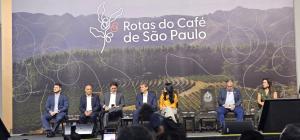
Secretary of Tourism of the State of São Paulo, Dr Roberto de Lucenaand Uiara Zagolin ( advice on international and diplomatic affairs)
The project will bring together producers, cooperatives, industry, and consumers, stimulate the creation of new companies, and strengthen local commerce and services, including the hotel network. With this boost, the plan aims to consolidate São Paulo’s position as a leading tourist and business destination in the coffee sector. The coffee sector contributed R$5 billion to São Paulo's agricultural production (VPA) in 2024. It ranked seventh among the 50 agricultural products with the best economic performance in the state, according to the São Paulo Institute of Agricultural Economics (IEA-Apta). The routes are: Cuesta, Itaqueri and Tietê Paulista Route (which comprise municipalities such as Brotas, Dois Córregos and Dourado); Paulista Waters Circuit Route (Serra Negra, Monte Alegre do Sul, Amparo and Campinas); Paulista Volcanic Mantiqueira Route (Caconde, Espírito Santo do Pinhal and Águas da Prata); Paulista Mogiana Route (Franca, Pedregulho, Patrocínio Paulista and Cristais Paulista) and Alta Paulista Route (Marília and Garça).
Likewise, there are coffee shops such as the Biological Institute, located in the capital; the Berelu farm, located in Cerqueira César; the Sol Nascente farm, in Ibiúna; and the APTA area of Adamantina. Among them are the Piratininga Coffee Museum/Fazenda São João, in Piratininga; the Coffee Museum in Santos; the Casa das Artes Studio and the Campo dos Sonhos Farm Hotel, both in Socorro; and Cabo Querência in Garça. The initiative is a partnership between the State Treasury Department, the Department of Tourism and Travel (Setur), the Department of Economy and Creative Industry (Secult), the Department of Agriculture and Supply (SAA), the Department of Economic Development (SDE), InvestSP, linked to SDE, and the Santos Coffee Museum.
The launch will also mark the opening of the exhibition “Women in Coffee: 1870-1930”, promoted by the Coffee Museum and open until April 23 at Palácio dos Bandeirantes. Namely, the São Paulo Coffee Routes are also connected to the SP Produz Program, of the Department of Economic Development, which recognizes, supports and promotes Local Production Chains (CPLs). There are three recognized CPLs for this coffee segment: Divinolândia, Caconde and Torrinha. Currently, the state has more than 12 thousand professionals employed in cultivation, and around 1.1 thousand in the wholesale trade of coffee beans in the state, according to data from Caged (Jan/2025).
Denny Silva
Life & Fashion Magazine
+1 914-490-6912
email us here
Legal Disclaimer:
EIN Presswire provides this news content "as is" without warranty of any kind. We do not accept any responsibility or liability for the accuracy, content, images, videos, licenses, completeness, legality, or reliability of the information contained in this article. If you have any complaints or copyright issues related to this article, kindly contact the author above.



